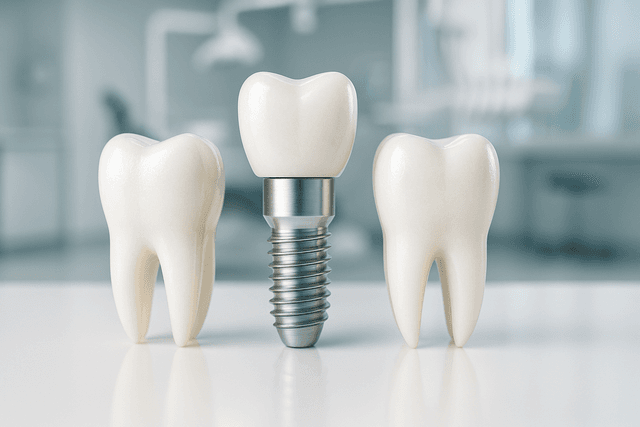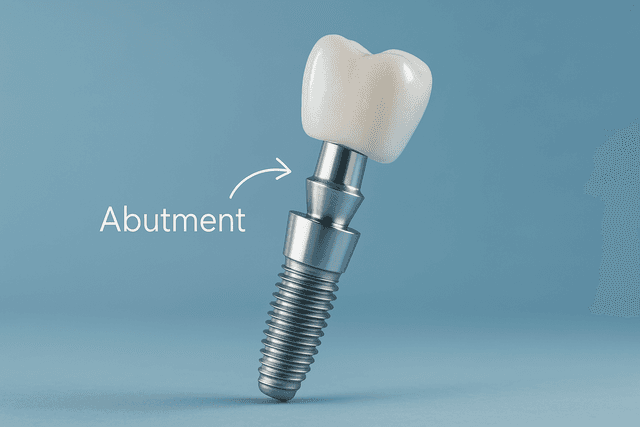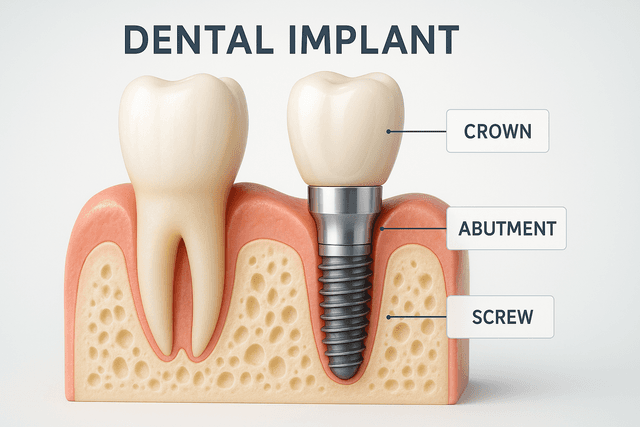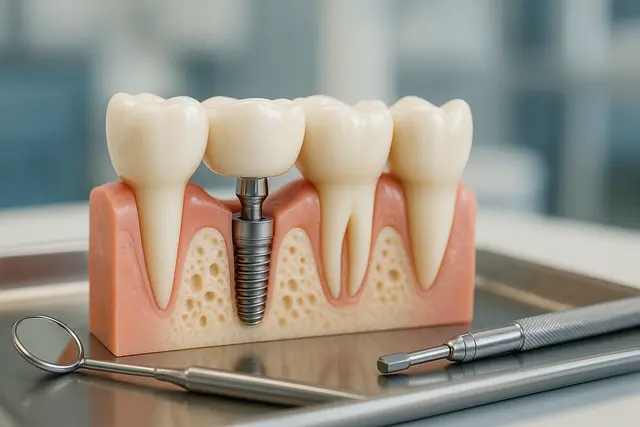Prosthodontics
4 min read
Oct 10, 2025
Implant Crown Lifespan: What to Expect Over Time
Getting a dental implant crown is a big step toward restoring both function and confidence in your smile. But like any dental work, it's natural to wonder how long it will actually hold up. From materials and maintenance to daily habits, several factors play a role in how long your implant crown will last.

So you’ve got an implant crown or you're thinking about getting one. First off, high five for making a great dental choice. Now you're probably wondering: how long does this shiny new addition actually last? Is it going to be like your favorite hoodie, comfortable, reliable, and good for years, or more like your phone charger, slowly fraying within six months?
Let’s talk about the real-life, day-to-day lifespan of your implant crown, and what you can expect as time goes on.
Crown Types and Their Different Dental Strengths
Not all crowns are created equal, which might sound dramatic, but it’s true. The type of crown you get plays a big role in how long it’ll last.
There are:
Porcelain crowns
Metal crowns
All-ceramic crowns
The crowd favorite for balance: porcelain-fused-to-metal crowns
Each has its own blend of strength and aesthetics. Porcelain gives that natural look but can chip under stress. Metal is strong but doesn’t exactly blend in unless you’re into the robot vibe. PFMs combine the best of both: durability with a natural-looking exterior.
If your crown is made of ceramic, it’s usually best for front teeth because it mimics natural teeth beautifully. For back teeth, especially a molar that takes the brunt of chewing forces, something tougher like a PFM or full metal option might be recommended by your dentist.
Implant Strength and the Role of Dental Implants
An implant isn’t just a fancy tooth topper. It’s actually a tiny titanium post embedded in your jawbone to hold your new artificial tooth (aka the crown) in place. A dental implant acts like the root of a natural tooth, and when done right, it’s rock solid.
Most dental implants last decades, some even a lifetime with proper care. So if something gives out eventually, it’s more likely the crown than the implant itself. Still, the overall longevity of implant crowns heavily relies on how well both parts work together, and how well you treat them.
Dental Crown Longevity and What Affects It
Let’s address the golden question: how long do dental crowns last? Most crowns last between five and 15 years, but many stretch well past that with proper care and maintenance. Some have been known to last anywhere from 10 to 30 years with proper care.
We’re not saying they’ll last forever, but hey, it’s possible they’ll stick around longer than your car.
The average lifespan of an implant crown really depends on several factors:
The crown type
Your oral hygiene habits
The material
How well your dentist did the job
Oral Hygiene Habits That Make Crowns Last Longer
If you want your implant crown to last as long as possible, you’ll need to practice good oral hygiene. That means brushing (twice a day, not just when you remember), flossing daily (yes, daily), and not using your teeth to open snack bags or bottles, no matter how tempting.
Bad oral hygiene can lead to gum disease, which may not destroy the crown itself, but can weaken the surrounding gum tissue and bone that holds your dental implant steady. Trust us, keeping your gums in shape is just as important as cleaning the crown.
Also, don’t skip those regular dental check-ups. Your dentist can catch early signs of wear, decay, or shifting before they become real issues. A quick check-up can add years to your crown’s life.
Temporary Crowns Versus the Real Deal
Before your permanent crown makes its grand entrance, you’ll likely wear a temporary one for a short while, kind of like a dental understudy.
These temps are just placeholders, not meant to win awards for strength or stability. They're more like “good enough for now” than “forever and always.” So if it wiggles a bit or makes a dramatic exit mid-meal (especially during a passionate bite of crusty bread), try not to panic.
It’s not a reflection on your oral hygiene or life choices. It’s just the crown doing what temporary crowns do best, underperforming. Hang in there, the real star is on its way.
The Lifespan of Different Crowns and Why Material Matters
So let’s talk numbers:
Metal crowns last anywhere from 15 to 30 years. They’re resistant to wear and not prone to chipping. The downside? They’re not exactly discreet.
Porcelain-fused-to-metal crowns give you that natural appearance and strength combo, typically lasting 10 to 15 years with proper oral hygiene.
All-ceramic or porcelain crowns, while prettier, are more fragile, especially under pressure.
So if you’re someone who chews ice or grinds teeth, let your dentist know so they can help protect that investment.
Long-Lasting Dental Crowns Need Proper Care
If there’s one takeaway here, it’s this: how long an implant crown lasts depends on the material, your habits, and regular TLC.
Wear a nightguard if you grind your teeth
Keep your oral hygiene in check
Avoid hard foods that could crack the crown
It’s also smart to look out for signs your crown might need replacing: looseness, pain, or visible wear. These don’t mean disaster is near, but they are signs to see a dental professional.
Can Implant Crowns Last a Lifetime?
Here's the million-dollar question: can implant crowns last a lifetime? The answer is… maybe. The implant part often can. The crown? With luck, love, and proper care, possibly. Realistically, though, most implant crowns last 10 to 15 years, maybe 30 years with proper care.
Crowns are tough. Crowns are durable. But they’re not invincible. That said, if your crown does need to be replaced, the process is relatively simple compared to the original implant surgery.
How Long Does an Implant Crown Typically Last?
Most implant crowns last between 10 and 15 years, though with proper care, some can last 20 to 30 years or more. The crown’s lifespan depends on factors such as the material used, your oral hygiene habits, and bite pressure. While the titanium implant itself can last a lifetime, the crown may eventually need replacement due to normal wear or small fractures from daily use.
What Factors Affect the Longevity of an Implant Crown?
Several key factors influence how long your implant crown will last. Material plays a big role, metal and porcelain-fused-to-metal crowns are stronger and more durable than all-ceramic ones. Your dentist’s technique, your chewing habits, and whether you grind your teeth also matter. Maintaining excellent oral hygiene and attending regular dental checkups help prevent gum disease, which can indirectly shorten the crown’s lifespan.
Can an Implant Crown Be Replaced Without Replacing the Implant?
Yes, replacing a worn or damaged implant crown does not require removing the implant itself. Since the implant acts as a stable foundation embedded in the jawbone, only the crown is swapped out. Your dentist will evaluate the fit and function, remove the old crown, and place a new one that matches your bite and smile. It’s a relatively simple process compared to the original implant surgery.
How Can You Make Your Implant Crown Last Longer?
To extend your crown’s lifespan, follow consistent oral hygiene habits, brush twice daily, floss carefully around the implant, and use a soft-bristled toothbrush. Avoid using your teeth to open packages or chew hard foods like ice or hard candy. If you grind your teeth, ask your dentist about a nightguard. Regular dental visits allow your dentist to check for early signs of wear, loosening, or gum irritation before they become major problems.
Read Next
Related Posts

Prosthodontics
Implant Abutment Explained: What It Is and Why It Matters
Dental implants have revolutionized the way we restore missing teeth, but there's more to them than just the visible crown. One often-overlooked component, the implant abutment, plays a crucial role in both the function and appearance of the final result. Understanding what it is and why it matters can make all the difference in your implant journey.
4 min read
Oct 10, 2025

Prosthodontics
Implant Abutment Screw Explained: Function, Types, and Placement
Dental implants have revolutionized the way we restore missing teeth, but beyond the visible crown lies a small yet essential component that ensures everything stays firmly in place: the implant abutment screw. Understanding its function, placement, and types is key to appreciating the science and precision behind a successful implant.
5 min read
Oct 10, 2025

Prosthodontics
Pros and Cons of Implant Retained Bridges: A Simple, Honest Overview
Missing teeth can affect more than just your smile, they can impact your confidence, speech, and even how you eat. With so many options out there, it’s easy to feel lost in dental jargon and marketing buzzwords. That’s why we’re breaking down implant retained bridges in plain English, highlighting the pros and cons so you can make an informed choice without the fluff.
6 min read
Oct 10, 2025
Don’t have time to research every dentist around you?
See why 30k+ patients trusted us